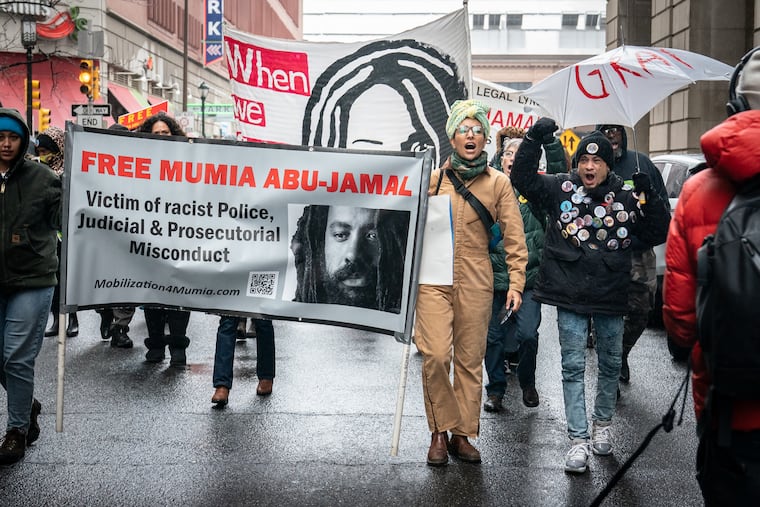What to know about the Mumia Abu-Jamal case and his latest appeal
The latest appeal focuses on documents that came to light in 2019.

Mumia Abu-Jamal is once again seeking to have his life sentence overturned, this time in an appeal following the emergence of documents that came to light in 2019.
Abu-Jamal, 68, however, is facing a skeptical judge who has signaled that she may dismiss his defense team’s latest appeal. Common Pleas Court Judge Lucretia Clemons said Friday that she would rule within three months.
The move is the latest in Abu-Jamal’s case, which dates back to December 1981, when Philadelphia Police Officer Daniel Faulkner was shot to death in Center City. Abu-Jamal was convicted the next year of killing Faulkner, and has since maintained his innocence.
As a result of the case and the legal battles that have ensued since his conviction, Abu-Jamal has long been a politically charged, internationally known figure. Here is what you need to know:
Who is Mumia Abu-Jamal?
Born Wesley Cook, Abu-Jamal was convicted of killing Faulker in 1982, and has since become a controversial figure in the criminal justice reform movement. Abu-Jamal is also a journalist and author, having published a number of books during his incarceration.
Before his arrest and conviction, Abu-Jamal worked as a radio journalist at stations including WHAT, WCAU-FM, WPEN, and WDAS. In January 1981, Abu-Jamal was named as a broadcaster to watch by Philadelphia magazine, which wrote that his “eloquent, often passionate, and always insightful interviews bring a special dimension to radio reporting.”
In 1979, he joined the staff of WHYY (then known as WUHY), but was asked to resign after about two years due to “a dispute over reporting the news objectively,” according to an Inquirer report. Nick Peters, then news director of WHYY, told The Inquirer in 1981 that Jamal was “an excellent writer and producer” who “had an incredible presence.”
Despite his work in radio, at the time of Faulkner’s murder, Abu-Jamal was working as a cab driver.
“I’m probably thought of, and rightly so, as a troublemaker,” Abu-Jamal told the long-defunct local paper Community in 1980. “Someone who raises his voice, someone who just doesn’t buy what he’s told.”
What happened on the night Daniel Faulkner was killed?
Faulker was killed Dec. 9, 1981. At the time, Faulkner was 25, and Abu-Jamal was 27.
In the 41 years since, conflicting accounts of what happened have emerged. But at Abu-Jamal’s trial, witnesses testified that they saw Abu-Jamal shoot Faulker, who had pulled over Abu-Jamal’s brother, William Cook, at 13th and Locust Streets at about 4 a.m.
Court documents indicate that during the stop, Cook and Faulkner got into an altercation, and Abu-Jamal intervened, shooting Faulkner in the back. Faulkner returned fire, striking Abu-Jamal in the chest. Prosecutors said at the trial that Abu-Jamal then stood over Faulkner and fired again, striking him in the face. Faulkner was taken to Jefferson Hospital, where he was pronounced dead at 5 a.m.
Abu-Jamal has said that before he received medical treatment for his wounds, police beat him. He was also taken to Jefferson, where doctors performed a 2½-hour surgery to remove a bullet that had perforated his liver and lodged in his back.
In July 1982, Abu-Jamal was found guilty of murder. Abu-Jamal has since maintained his innocence, saying that another unknown assailant shot and killed Faulkner.
Is Mumia Abu-Jamal on death row?
Abu-Jamal is serving a life sentence without parole. He is incarcerated in a state facility near Hazleton.
Initially, Common Pleas Judge Albert F. Sabo sentenced Abu-Jamal to death in 1983.
Abu-Jamal filed several appeals that were denied and lived under his death sentence for about two decades. A federal judge voided Abu-Jamal’s death sentence in 2001, but upheld his conviction. The jury had been given incorrect instructions when considering a penalty, U.S. District Judge William H. Yohn Jr. ruled.
The Philadelphia District Attorney’s Office attempted to have the death sentence reinstated for a decade. But in 2011, then-District Attorney Seth Williams said he would not seek a new death penalty hearing for Abu-Jamal.
“Every reviewing court has found the trial fair and the guilty verdict sound,” Williams said at a press conference. ”...Our best remaining option is to let Mr. Abu-Jamal to die in prison.”
What is Mumia Abu-Jamal’s latest appeal?
Since his conviction, Abu-Jamal has filed eight appeals in his case. The latest comes following a development in 2019, when city prosecutors gave the defense six file boxes related to his case. Staff members, prosecutors said, inadvertently found them while looking for office furniture.
Abu-Jamal’s legal team says that the materials in the boxes suggest that prosecutors paid a key witness, Robert Chobert, to testify against him. Additionally, the defense says, the documents show that prosecutors improperly promised leniency to another witness in her own pending prostitution cases, and barred Black candidates from serving on the jury.
Both sides argued their cases in court on Friday in front of about 50 Abu-Jamal supporters, as well as Faulkner’s widow, Maureen, and her supporters. Clemons urged attorneys to ensure that Abu-Jamal’s team was able review everything the District Attorney’s Office could provide before she rules.
“I do not want to do this again,” she said.